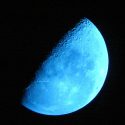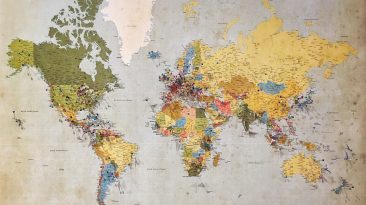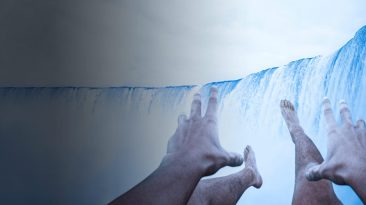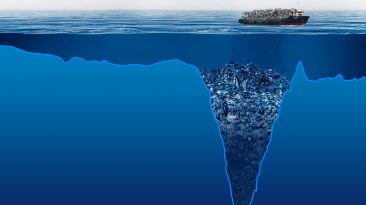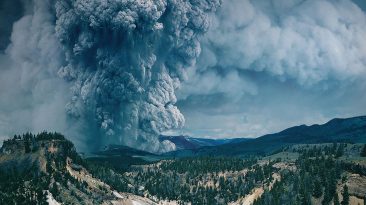Cities have been named after it, economies have been built on it, wars have been fought over it, your life depends on it. Salt may be the most important, and the most divisive, mineral in history.
What is it worth to us today? There are more than 14,000 uses for salt, but to most of us, it only means one thing: high blood pressure.
Back in the day, your salary might’ve been paid in salt, and it might’ve been heavily taxed. It could’ve preserved your food, healed your wounds, and brought good fortune.
Today, beyond being the reason why that burger, that pretzel, and those french fries taste so good right now, salt is important for de-icing, chemical processing, water treatment, farming and for several uses in the oil and gas industries.
It’s also made up of two elements that, on their own, kill you; but together, they keep you alive. Want to see what happens when you put sodium in water? Do you know what chlorine does to you?
Also known as sodium chloride. Two deadly elements combined into one you can’t live without.
Salt has a number of crucial benefits, like helping your body transmit nerve signals so that your muscles can relax and contract, enabling your heart to pump blood. It’s also important for digesting nutrients and fighting infections.
But hold on there, Mr. Peanut, you can have too much of a good thing. While low blood sodium may cause fatigue, vomiting, seizures, or even death, too much salt can end up accumulating between your cells, thickening your blood, making your heart work harder, and often resulting in… cardiac arrest.
Your body naturally has about 40 teaspoons of salt in it, or roughly 0.4% of your body weight. But every time you cry, sweat, or pee, you lose some of that salt, and it needs to be replaced.
The American Heart Association recommends that adults get between 1,500 mg to 2,300 mg of salt per day. But that only amounts to one bag of chips, or two California rolls.
Meanwhile, that burger and fries you were eyeing have about 3,400 mg. So maybe you’re thinking it’s time to start cutting back on your salt intake.
Sure, but don’t cut it all out. In the 1930s, Dr. Robert McCance of Cambridge University’s Department of Experimental Medicine got 4 volunteers to go 10 days without salt.
First he had them sweat out all the salt in their bodies, then he literally desalinated everything they consumed. It wasn’t long before the participants began to realize they weren’t tasting much flavor in anything.
Then fatigue set in, and they became too tired to even eat! Signs of hyponatremia started to show, which basically means that your blood cells start swelling because there’s not enough salt in your blood to regulate how much water a cell will consume.
Left untreated, hyponatremia can result in seizures, coma and death. At the end of the trial, participants were given salty foods, and within minutes they could taste again and their energy quickly came back.
If that’s just 10 days without salt, imagine if it simply ceased to exist. We wouldn’t last very long.
And not just us, plants and animals need salt as much as we do! The mere desalinization of our oceans would wipe out all our underwater algae, cutting photosynthesis on Earth in half.
Land-based plantlife would follow, and soon we’d be facing an issue of too much carbon dioxide and not enough oxygen. Our climate would go crazy, fluctuating between extreme hot and cold temperatures, with a dramatic surge in hurricanes.
Of course, tumultuous weather, food shortages, and lack of oxygen would be even harder to process since you’d also be suffering from dizzying headaches, vomiting, and extreme fatigue. Any numbness or chest pain you might experience is probably an oncoming heart attack.
But instead of running for an overcrowded hospital, get to the nearest convenience store! If you’re lucky, there’ll still be some chips and Gatorade left on the shelves. But that’s assuming that no one else who is feeling totally helpless in the face of this mass desalination event has seen this video!
Subscribe to What-If on Youtube or follow the show on Facebook Watch.
Sources
- Fisher, Len. 2019. “How Much Salt Is In A Human Body?”. Down, Dan, BBC Science Focus Magazine. Accessed August 13 2019.
- “All About The Salt Industry”. Sheth, Khushboo. 2019. Worldatlas. Accessed August 13 2019.
- “NPR Choice Page”. Nell Greenfieldboyce, 2019. npr.org. Accessed August 13 2019.
- “Humans Wouldn’t Be Able To Get By Without Salt”. 2019. San Antonio Express-News. Accessed August 13 2019.
- “The Salt Wars”. Nicola Twilley, Gastropod. 2016. The Atlantic. Accessed August 13 2019.
- “Take It With A Grain Of Salt – Harvard Health”. Harvard Health. Accessed August 13 2019.
- “The Horrible Things That Happen If You Don’t Get Enough Sodium” 2019. io9.gizmodo.com. Accessed August 13 2019.
- “Low Blood Sodium (Hyponatremia)”. 2019. Healthline. Accessed August 13 2019.
- “What If Photosynthesis Stopped Happening?”. Garden, Home, Science Myth, and What If. 2015. Howstuffworks. Accessed August 13 2019.










